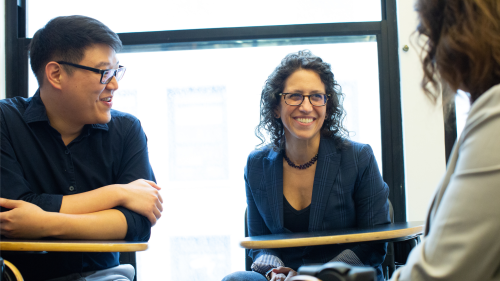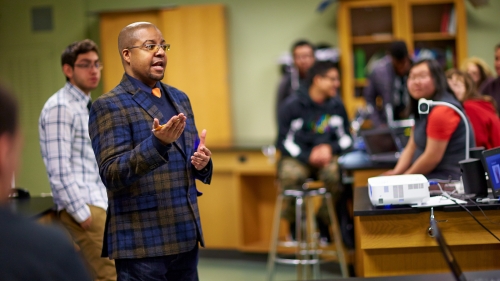A new study finds that White English-speaking students are the only group with a positive relationship between STEM aptitude and STEM college enrollment.
Research studies have consistently identified early academic disparities as the greatest barrier to STEM representation for non-white students. To address the lack of racial and ethnic diversity in STEM, education policies have sought to improve math and science performance in middle and high schools.
A new study refutes these policy assumptions about the STEM pipeline, finding that White English-speaking students are the only group with a positive relationship between early STEM aptitude and STEM enrollment in a higher education institution. For Black and Latine students, early STEM aptitude does not translate into STEM enrollment in the same way.
“Decades of funding to diversify STEM by investing more in early academic preparation may be built on a premise that not only is empirically shaky, but disproportionately favors White students,” says Hua-Yu Sebastian Cherng, the study’s lead author, associate professor of international education, and vice dean for research and equity at NYU Steinhardt School of Culture, Education, and Human Development.
Cherng's co-authors from Steinhardt include Professor of Childhood Education Okhee Lee, Professor Emerita of Applied Psychology Sumie Okazaki, PhD student in Higher and Postsecondary Education Tim Carroll, and Applied Statistics for Social Science Research alum Martha Moreno (MS ’18), as well as professors from City University of New York (CUNY) Queens College and the University of Texas at Austin.
They analyzed New York City Department of Education data for all public-school students enrolled in ninth grade from 2002 through 2011. They evaluated their records (e.g., math test scores, high school diploma type, school characteristics such as expenditures and student enrollment, and race/ethnicity) from seventh grade through their first semester at CUNY (selected for having a large majority of New York City high school graduates compared to any other university in the U.S.). They tracked the outcomes of 10 racial/ethnic groups to find the correlation between early academic success and the declaration of a STEM major at the end of their first year at a two- or four-year CUNY institution. The 10 groups comprised Asian English speakers, Black English speakers, Latine English Speakers, White English speakers, Spanish speakers, Cantonese speakers, Mandarin speakers, Korean speakers, speakers of languages from South Asia, and Black French speakers.

The answer to addressing [racial inequality] is not just to think better of others, but to interrogate our fundamental understanding of meritocracy and fallacious explanations of achievement.
Their results, published in American Journal of Education, found that disparities in early test scores, high school diploma type, and school characteristics were only correlated to enrollment rates of White English-speaking students majoring in STEM at two- and four-year institutions.
Additional findings among the racial/ethnic groups include the following:
- Students speaking Korean, Mandarin, Cantonese, and South Asian languages (Bengali/Hindi/Punjabi/Urdu) are more likely to declare STEM majors despite not being in the top 25 percent for math scores.
- For Black English speakers, Black French speakers, Latine English speakers, and Latine Spanish speakers, a far higher proportion show promise in STEM subjects, but do not necessarily declare four-year STEM majors.
“A large body of research has shown the importance of STEM ideation—the idea that young people can see themselves in the field—as being particularly important for groups not represented in STEM,” Cherng says. “To foster these identities, research has pointed to the importance of teachers, families, and community in empowering young people who may not see themselves reflected in STEM careers. I would be remiss if I did not mention the role of discrimination: it is not just that certain groups of young people happen not to get the support they need. Our findings fit into a larger portrait of racial inequality that has been pervasive throughout the history of U.S. education. And the answer to addressing it is not just to think better of others, but to interrogate our fundamental understanding of meritocracy and fallacious explanations of achievement.”
This study was supported by a grant from the National Science Foundation (2017856).
Press Contact
(646) 469-8496
Related Articles
Social-Emotional Growth Linked to Higher Math and English Scores
Positive changes in growth mindset and self-management predicted better attendance and higher test scores comparable to additional days in the classroom.
Black High School Students Less Likely to Enroll in AP Math Courses Than White Students with Similar Academic Preparedness, Study Finds
Steinhardt researchers found that although 24% of white students in New York City high schools enroll in at least one AP mathematics course by the end of high school, only 13% of Black students do so.
Heddy Lahmann Leads International Youth Musicians in Cultural Exchange
700+ students participated in cultural exchange and peacebuilding workshops as part of Carnegie Hall’s World Orchestra Week (WOW!) Festival.








